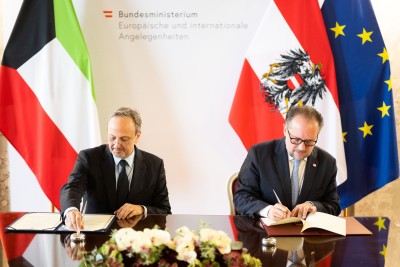Kuwaiti Foreign Minister Strengthens Economic Ties with Austria During First Europe Trip
Kuwaiti Foreign Minister Sheikh Salem Abdullah Al-Jaber Al-Sabah met for working talks with Austrian Foreign Minister Alexander Schallenberg in Vienna. The visit of the Kuwaiti Foreign Minister to Vienna underlines the interest of both countries in further strengthening economic relations and intensifying cooperation at the geopolitical level.
 Kuwaiti Foreign Minister Sheikh Salem Abdullah Al-Jaber Al-Sabah (l.) and Austrian Foreign Minister Alexander Schallenberg (r.). / Picture: © BMEIA Bundesministerium für Europa, Integration und Äußeres / Gruber / Flickr Attribution 2.0 Generic (CC BY 2.0)
Kuwaiti Foreign Minister Sheikh Salem Abdullah Al-Jaber Al-Sabah (l.) and Austrian Foreign Minister Alexander Schallenberg (r.). / Picture: © BMEIA Bundesministerium für Europa, Integration und Äußeres / Gruber / Flickr Attribution 2.0 Generic (CC BY 2.0)
Above all, this visit marks Foreign Minister Al-Sabah's first trip to Europe since his recent reappointment. The meeting focused on bilateral relations, in particular the possibilities for further deepening economic cooperation. In addition, current developments in the Middle East and the global impact of Russia's war of aggression against Ukraine were discussed.
Foreign Minister Schallenberg stressed that Austrian-Kuwaiti relations were already good on the economic level, but that there was still potential for improvement. In particular, Austrian know-how in healthcare, infrastructure, green technologies, and renewable energy could be of interest to Kuwait, he said, as there is still untapped potential there. Schallenberg was also pleased that Kuwait was again appreciating Austria as a vacation destination after the restrictions imposed by the pandemic, as evidenced by the current five weekly direct flights.
In the further course of the conversation, Foreign Minister Schallenberg emphasized the importance of the bilateral memoranda of understanding between Austria and Kuwait, which were agreed upon in Vienna. These include regular political consultations between the two countries as well as cooperation between the Austrian Development Agency (ADA) and the Kuwaiti Fund for Economic Development within the framework of development cooperation. Schallenberg also stressed that Austrian companies were already operating successfully in Kuwait and were interested in further joint ventures. The memoranda of understanding formed a good basis for this.
In addition to bilateral cooperation, Foreign Ministers Schallenberg and Al-Sabah also discussed current developments in the Middle East and the Russian war of aggression against Ukraine. Schallenberg clarified that Kuwait itself, as a victim of Saddam Hussein's aggression, had experienced the consequences for the civilian population of a war of aggression that violated international law.
According to Schallenberg, the situation in Iran, Iraq, Syria, and the Middle East peace process deserve special attention. He pointed to the monitoring of the Abraham Accords between Israel and some Arab states, the rapprochement between Saudi Arabia and Iran, and Assad's readmission to the Arab League. Schallenberg stressed that Europe should work closely with the Gulf Cooperation Council countries because there is a common interest in peace, stability, energy security, trade, and investment. The tremors in the Gulf region and the Middle East could have repercussions as far away as Austria and Europe, as many things in this region are currently in upheaval, Schallenberg said.



